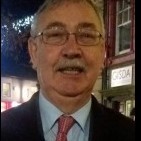Arthur Whitham (1893-1942) was born to a weaver called James William Whitham and his wife Margaret of 106 Hurtley Street, Burnley. He went on to become a socialist and an activist for the Independent Labour Party and a speaker of Esperanto, and travelled widely using the language.
The planned international language Esperanto, which meant so much to him, arrived in Burnley well before the First World War. Two local people appeared in the Adresaro (Directory of Esperanto speakers) for 1906. They were Pastro (i.e. Rev.) J. Morgan Whiteman of 312 Padiham Road, and J. Simpson of 28 Keith Street. In April 1906 a Burley Esperanto Society was formed, with J.W. Hartley of 24 Lubbock Street as its secretary. That Society continued to meet through the two world wars until about 1975. In 1913 there were two separate Esperanto societies in the town, both meeting every day. The secretary of one was Miss Judson, while the other, calling itself ‘Antaǔen’ (Forwards) had T. Fernley as secretary.
We must presume that Arthur Whitham learned the new language through one of the Burmley Esperanto societies.
He was certainly familiar with Esperanto in 1913, because he appears as the local representative for Burnley in the Jarlibro (Year Book) of Universala Esperanto-Asocio for that year. His address then was given as 20 Hornley Street. His deputy was Herbert Hardaker of 27 St Mathews Street.
It is possible to piece together some of his story, although there are gaps to be filled. It is possible that he served as a soldier in the Loyal North Lancashire Regiment, but there are so many men with the same name that it is difficult to be sure.
He married fellow cotton weaver Annie Leeming in 1920. His international travels using Esperanto began the following year. In the summer of 1921 he visited Prague, then in Czechoslovakia, after taking part in the German Congress held in Dresden. Arthur Whitham gave several talks on his travels, not only in Burnley, but also in neighbouring Nelson. I can find no trace of his writing an account of his experiences, although he clearly spoke well.
Local newspapers reported extensively on his travels, partly because he was a local ‘character’ and partly because it was so unusual at that time for a working class person to travel widely and independently.
AN ESPERANTIST’S VISIT TO PRAGUE. —On Thursday the Nelson Esperanto Society were favoured with a lecture from Mr. Arthur Whitham, Burnley, on his recent visit to the 13th Universal Congress of Esperantists at Prague. Leaving Burnley in good time Mr. Whitham found it possible to visit also the National Congress of German Esperantists at Dresden, which took place several days prior to that at Prague. After the latter congress some time was spent in the northern part of Chechoslovakia (sic). In Dresden the people are still rationed for bread, coupons having to he used. Owing to the tremendous fall in the value of the mark, the lecturer and a friend were able to dine at the best hotel for 4s. (including waiter’s gratuities and all charges for the two persons)! Travelling about in the company of people of almost every nationality he found, as he experienced on previous occasions, that Esperanto quite vindicated its claim to be presentday practical medium both for pleasure and business. One cannot see 2,500 people of over 40 different tongues meeting together in unity and understanding and remain a sceptic as to the language which enables them to do it. Returning alone through Germany, Mr. Whitham said he experienced nothing but kindness everywhere. Glowing tribute was paid to the services rendered by the delegates of the Universal Esperanto Association who met the visitors and conducted them from the station to the hotel, acting as interpreters where Esperanto was not understood, and in many ways removing difficulties usually encountered. Seeing a card in shop window "English spoken here,” Mr. Whitham essayed a joke. Entering the shop he addressed the attendant in broad Lancashire dialect. "Wheer is that mon as can talk English” (or some such phrase). ”He is here," replied the man, ”and I perceive that you are from Lancashire.” The joke having rnlssed fire, the visitor learned that the attendant formerly lived in Blackpool. The lecture was delivered entirely in Esperanto, and was thoroughly enjoyed the members of the local society. (Nelson Leader - Friday 14 October 1921)
We know that Arthur Whitham stayed with a couple Mr and Mrs Willi Weisskopf of Saaz, a small village now in Austria.
A little over a year later, Arthur Whitham gave a similar talk in Nelson, which also diligently reported.
THE CONDITIONS IN CENTRAL EUROPE. • LECTURE AT NELSON
On Tuesday evening Mr. Arthur Whitham, of Burnley, gave a very interesting lecture, in Esperanto, to the members of the Nelson Esperanto Society, in the Co-operative Room, Chapel House Road. Mr. Whitham gave a varied picture, of the condition of the people in Central Europe, as seen by him last summer, during his tour of three months duration. In Vienna, where he spent six weeks, the lecturer found beggars in every street, the condition the people being most pitiable. Notwithstanding their extreme poverty, the mass of the people by virtue of extreme care with their attire contrive to keep up appearance of respectability. Many Austrians, of whose good nature and fine qualities Mr. Whitham spoke with deep appreciation, told him that had it not been for the generous help of English and American relief societies, they must inevitably have died in thousands. The country is poor indeed, but its people are rich in the qualities which go to make up a fine manhood. Regarding Esperanto and its utility for travellers, Mr. Whitham was more enthusiastic than ever, if that is possible. It is often said that English is known everywhere, but this is not true. However serviceable English may be on the beaten track, it is not compared with Esperanto in the small countries of Central Europe, in Northern Bohemia, for instance. Esperanto is much more serviceable than English. In Czechoslovakia the three or four races which make up the population are quite hostile to the use each other's language, and Esperanto is making great headway. Anyone with a good knowledge of Esperanto who will take the trouble to write to the delegate of the Universal Esperanto Association in the various places he intends to visit will be assured of adequate help and a multitude of kindnesses irrespective of the nationality of the persons concerned. Mr. Whitham intends to visit the Esperanto Congress at Nuremburg next August. (Nelson Leader - Friday 22 December 1922)
After some years active in the neutral Esperanto organisation, Arthur Whitham joined Sennacieca Asocio Tutmonda (World Non-national Association). SAT was founded in 1921 by Eugène Lanti (pseudonym of Eugène Adam) and others as an organisation of the workers' Esperanto movement. In view of his political views, it is clear that Whitham saw his home as a member of SAT.
The Esperanto press also reported on his visit to Pilzeň (Pilsen)
Kara gasto de L.L.E. (=Laborista Ligo Esperantista en Pilzeň estis dum kelkaj tagoj S-o Arthur Whitham el Burnley (Anglujo), kiu per siaj rakontoj entuziasmigis la membrojn al la nova laboro. (La Progreso, 1. July 1922) In English : A dear guest of the WorkersEsperanto League in Pilzeň for a few days was Mr Arthur Whitham from Burnley (England), who, by his stories enthused the members to new work.
In 1923 Whitham joined the 3rd SAT Congress in Germany, but I can find no evidence that he was present there. I cannot find any evidence of Arthur Whitham travelling abroad in 1923 and 1924, but we do know that in 1925 he travelled alone overland to the Soviet Union. One cannot exaggerate the interest in and suspicion about the Soviet Union in the United Kingdom at that time.
UNDER SOVIET RULE.
Burnley Man's Experiences in Russia.
BOROUGH MEMBER'S HELP.
Mr. Arthur Whitham, of 20, Hornby-street, Burnley, who is well known in Burnley Trade Union and Socialist circles, has this week returned from an adventurous and extremely interesting visit he has paid to Russia. Mr. Whitham, vho was in Russia from the first week in August, went entirely "on his own for the purpose of studying conditions at first hand, and he has come back able to give remarkable accounts of political, industrial and social conditions under the Soviet system. Many of the difficulties attending any attempt to enter Russia - unless one goes as a "privileged person" were smoothed away by Mr. Whitham being able to refer the representatives of the Soviet in London to Mr. Arthur Henderson, the Borough Member. One of the difficulties is that three months' notice is required for any "unprivileged" person wishing to visit Russia; but Mr. Whitham, with the assistance of Mr. Henderson, was able to persuade the Russian Consul-General in London that this was unnecessary in his case. Mr. Whitham states that after the frontier difficulties were over he had nothing but kindness from the representatives of the Communist Party. "Wherever I went," Mr. Whitham told a "Burnley News” representative last night, "they did their best to help me, whether I was visiting the villages, or the prisons, or the factories and workshops. It was always the same. Doors were thrown wide open, and always the greeting was, 'What can we do for you, comrade?' They did not know I was coming, and therefore it couldn't be a case of things being prepared for one." Mr.Whitham addressed meetings in various places, and found the Russian workers everywhere eager to learn about political conditions in England and especially about the prospects of Communist revolution in this country. Mr. Whitham says he had to tell them plainly that their eager expectations in this direction were not warranted in any sense by the facts, and described vividly the surprise of the Russian workers at the apparent lethargy the "proletariat" of this country on the question of getting rid of their "chains". Mr. Whitham has brought back examples of Soviet posters (advertising the advantages of dealing with the Co-operative shops in Russia), and some interesting photographs. But much of the literature he had collected was confiscated when he entered Poland on his return journey. Mr. Whitham has, as stated, a great deal that is interesting to say about various aspects of the Soviet regime in Russia, and in next Wednesday's, issue of the "Burnley News" a full account of his observations and comments will be given. (Burnley News, Saturday 12 September 1925)
The Burnley News even printed a short text in the planned language, with a few errors.
LA OFICIALA LINGVO D£ LABORO. La Sinkikata Kongreso en Scarborough akceptiis rezolucion de la Amalgamated Engineering Union, kiu instruis la Generalan Konsilantaron adopti Esperauton kiel la oficialan. internacian lingvon. Oni bonvenigis delegitojn el Kanado, Usono, Rusujo kaj La Sindikata Kongreso en Scarborough Meksikio. Translation -The Trades Union Congress at Scarborough accepted. a resolution from the Amalgamated Engineering Union, instructing the General Council to adopt Esperanto as the official international language. Delegates from Canada, the United States, Russia and Mexico were enthusiastically welcomed. ln view of the above resolution it is interesting to note that Mr. Arthur Whitham in his interview with the "Burnley News" on Wednesday makes mention that Esperanto enabled him to converse freely with people on the Continent during his three months tour, from which he has just returned. One wonders why children at school and at college are allowed to rack their brains learning several languages, when it would be much easier to teach .them a common language. In the new movements that are taking place industrially and politically all over the world, it is interesting to note that the workers' organisations are realising "the handicap of language and are endeavouring to overcome it. (Burnley News, Saturday 19 September 1925)
"RUSSIA - MY IMPRESSIONS"
No one should miss the opportunity of hearing a lecture on Russia first hand. On Thursday, October 1st, at 7-30. p.m., Mr. Arthur Whitham will speak on Russia in a lecture entitled. "Russia: My Impressions." Mr. Whitham's many friends need no reminding that his "lectures" are always entertaining and interesting. More than one quarterly meeting of members of the Burnley Weavers' Association has been given an added interest when Mr. Whitham has risen to lead the debate. l am looking forward to the lecture myself very much. Lectures on Russia have been given in Burnley before many times—but usually the lecturer's interpreter has taken the "life" out of the subject. Mr. Whitham will give us Russia in plain, homely, Lancashire phraseology. (Burnley News - 19 September 1925)
Sennaciulo, the periodical of the lefty-wing movement SAT published an article on 24 September 1925, entitled ”Kelkaj rezultoj de laboristaj ekskursoj en Sovet-Unio” (Some results of workers’ trips to the Soviet Union) mentioning Whitham, but mis-spelled his name as Witham.
In 1926 Arthur Whitham joined the SAT Congress in Leningrad as participant number 198. Again he extended his visit in order to experience more of life in the Soviet Union. Again the Burnley News saw his experiences as newsworthy, dedicating almost a whole page to his travels, and printing a photo of a group of men and women cotton workers in Ivanovo, Mr. Whitham himself being seated among the group. This visit took place just after the General Strike of May 1926.
MORE LIGHT ON RUSSIA, MR ARTHUR WHITHAM'S SECOND VISIT
A Burnley man, Mr Arthur Whitham, of Reed Street, Burnley Wood, well known in connection with the local Socialist movement, and also a stalwart of Esperanto has recently paid a second visit to Soviet Russia, and has brought back with him interesting news of the present situation there, along with some souvenirs and curiosities which help to throw light on the trend of affairs under the successors of Lenin. It may be remembered that Mr. Whitham, alone and unaided, so to speak, by any high official recommendation was able to reach the interior of Russia last year, and, once inside, succeeded in striking up acquaintance with many influential representatives of the Soviet regime, and brought home much interesting news of the institutions and practices set up under the Communist control. We published at the time a full account of his impressions. ..
An Approved Visitor, Mr Whitham left Burnley on another visit to Russia late in July this year, and returned towards the end of October. He has already given some account of his new experiences and observations in the Soviet Republic to Burnley Esperantists, and also this week to members of the Harle Syke Branch of the I.L.P. He has much to tell which is of considerable interest in present circumstances, and to "Burnley News" representative on Thursday he gave details of his journey and of his impressions ...
Mr Whitham's primary object was to attend an International Socialist Congress, which was held at Leningrad (the former St. Petersburg). This was attended by representatives of about a score of nations, including most of the European peoples, Chinese, Japanese, and other Asiatic races were also represented. There were 35 delegates in all from England. Mr. Whitham's visit last year gave him a special status at the Congress. He was elected one of the vice-presidents, and in that capacity sat with other officers on the "praesidium" of the hall where the Congress met (this was in the former Russian "House of Commons" — the Duma building of the old regime. The sessions of the Congress occupied a week, and then Mr. Whitham spent nearly two months looking at things Russian in the big towns and the little villages.
Mr. Whitham mentions that textile wages, which, as mentioned in the accounts of his last year's vsiit, are on a much lower level than in England, have been going up. A rise in the cost of living accompanies the wages increase, nevertheless, and Mr. Whitham repeats what he ponted out last year - that the work done for the wages is much less than in this country, the Russian operatives seldom having more than two looms He speaks again also, with some admiration, of the system of providing cheap meals for the mill workers in kitchens at the mills. "I had a good three-course dinner at one of them for ninepence!" Mr. Whitham said. Nevertheless, the higher quality of British goods appears to be one of the vivid impressions Mr. Whitham brings back with him. What he saw of the textile products, not merely of the Russian worker, but of the continental operative generally, led him to this somewhat emphatic conclusion.
BURNLEY MACHINERY. "There is still a big housing problem," Mr. Whitham went on, “and the population is growing at a great rate, especially in the big towns. There is an unemployed problem. But it isn't a big one; the officials of the textile unions told me their unemployed would all be working within a month." Mr. Whitham mentions that in one factory he noticed an old tape machine bearing the name of a Burnley firm—Messrs. Butterworth and Dickinson. In other places he saw machinery which had come from Lancashire frms, such Messrs. Tweedale and Smalley. as the result of the placing of Soviet orders in this country a year or more ago. Mr. Whitham spent an interesting time at Ivanovo, a town known among the Russians as "Red Manchester."...
Mr. Whitham brings back a very positive conviction that there is no directly political motive behind the big drafts of Russian money which have come to this country in aid of British miners during the coal trouble. He gave public addresses – one of them in a town hall – on the British miners’ situation in the coal struggle, and on working-class conditions generally in the country.
... He speaks again also, with some admiration, of the system of providing cheap meals for the mill workers in kitchens at the mills. "I had a good three-course dinner at one of them for ninepence!" Mr. Whitham said. Nevertheless, the higher quality of British goods appears to be one of the vivid impressions Mr. Whitham brings back with him. What he saw of the textile products, not merely of the Russian worker, but of the continental operative generally led him to this somewhat emphatic conclusion. ...
And I have no doubt whatever,” Mr. Whitham stated, "from what I saw of the propaganda on the matter, that the millions of money sent to the miners of the country has come from the Russian workers themselves. After one of my addresses, they decided each to give fourth of a day's pay, and they gave their money there and elsewhere undoubtedly because the British miners are workers like themselves, and because they believed they were in a bad way. There is genuine sympathy for the workers of every country. It is probably true that the money has been given, also, in the idea that it would help the prolongation of the strike; but when I asked if they were hoping for a revolution in this country, they asked if I imagined they were foolish to think a revolution could be produced with the money they were giving. There was enthusiasm everywhere for the cause of the British miners." Mr. Whitham gives the impression that he saw and heard little to justify the suggestion that recent differences among the leaders of the Communist party constitute a menace to the security of the present Soviet regime. There are troubles in the party, he says, but he thinks the responsible leaders are strong enough to ward off any danger to the Soviet political order as it stands. He does not think there is any special sympathy, politically speaking, between the Soviet and the republican regime in Germany.
... Among his interesting personal experiences Mr. Whitham mentions a visit to a barracks at Smolensk. He was introduced to the Commandant by a soldier-Esperantist with whom he had become friendly at the Congress. There was special parade of the troops, and Mr. Whitham addressed them. He was made honorary Officer of a Cavalry regiment, and presented with the regimental shoulder badge.
The Burnley man also paid visits to schools and prisons. He spoke to children at the schools, and found them well up in geography. The teachers are capable but ill-paid. At the prisons he found an undue tendency to leniency of treatment, resulting in some offenders appearing again and again as prisoners without detriment to their cheerfulness. (Burnley News - Saturday 20 November 1926)
Arthur Whitham was not alone in Burnley in having left-wing and Esperanto leanings. Listed in the 1927 Jarlibro (Yearbook) of Sennacieca Asocio Tutmonda (Worldwide Non-Nationalist Association) alongside him is K-do (Comrade) Herbert Ward, also a weaver, of 8 Brockenhust Street. In the 1928 Yearbook they are joined by A.C. Bland of 61 Williams Street.
Esperanto was relatively strong in the town. In 1928 no less than thirteen people from Burnley attended the Universala Kongreso held in Belgium. They were:
F-ino (=Miss) Annie Lancaster, oficistino (=office worker), F-ino (=Miss) Annie Hurley, F-ino (=Miss) Ada Greenwood, F-ino (=Miss) Emile Poppleton, F-ino (=Miss) Elizabeth Shackleton, oficistino (=office worker), S-ro (=Mr) William Foulds, oficisto, (=office worker), S-ino Elizabeth Foulds, S-ro (=Mr) Mason Stuttard, teksisto, S-ino Mason Stuttard, F-ino (=Miss) Dora Bowker, teksistino, S-ro (=Mr) Thomas Bond, teksisto, S-ro (=Mr) Jack Shuttleworth, teksisto, F-ino (=Miss) Susan Alice Hartley, teksistino. The last four names, as well as Mason Stuttard, all declared themselves to be weavers. Mason Stuttard (1903-1983) wrote a popular Esperanto textbook which had five separate editions, and he wrote stories and poetry in the language. A talented speaker of several languages, he did not return home to UK after the Second World War, but remained in Yugoslavia for many years as Tito's personal English interpreter.








Recommended Comments
There are no comments to display.
Create an account or sign in to comment
You need to be a member in order to leave a comment
Create an account
Sign up for a new account in our community. It's easy!
Register a new accountSign in
Already have an account? Sign in here.
Sign In Now